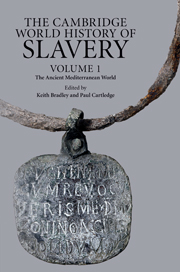Book contents
- Frontmatter
- Contents
- Series editors' introduction
- List of figures
- Acknowledgements
- Introduction
- 1 Slavery in the ancient Near East
- 2 Slaves in Greek literary culture
- 3 Classical Athens
- 4 The Helots: a contemporary review
- 5 Slavery and economy in the Greek world
- 6 The slave supply in classical Greece
- 7 Slavery and the Greek family
- 8 Resistance among chattel slaves in the classical Greek world
- 9 Archaeology and Greek slavery
- 10 Slavery in the Hellenistic world
- 11 Slavery and Roman literary culture
- 12 Slavery in the Roman Republic
- 13 Slavery Under the Principate
- 14 The Roman slave supply
- 15 Slave labour and Roman society
- 16 Slavery and the Roman family
- 17 Resisting slavery at Rome
- 18 Slavery and Roman material culture
- 19 Slavery and Roman law
- 20 Slavery and the Jews
- 21 Slavery and the rise of Christianity
- 22 Slavery in the late Roman world
- Bibliography
- General index
- Index of ancient passages cited
- Index of inscriptions and papyri
- Index of Jewish and Christian Literature Cited
2 - Slaves in Greek literary culture
Published online by Cambridge University Press: 28 September 2011
- Frontmatter
- Contents
- Series editors' introduction
- List of figures
- Acknowledgements
- Introduction
- 1 Slavery in the ancient Near East
- 2 Slaves in Greek literary culture
- 3 Classical Athens
- 4 The Helots: a contemporary review
- 5 Slavery and economy in the Greek world
- 6 The slave supply in classical Greece
- 7 Slavery and the Greek family
- 8 Resistance among chattel slaves in the classical Greek world
- 9 Archaeology and Greek slavery
- 10 Slavery in the Hellenistic world
- 11 Slavery and Roman literary culture
- 12 Slavery in the Roman Republic
- 13 Slavery Under the Principate
- 14 The Roman slave supply
- 15 Slave labour and Roman society
- 16 Slavery and the Roman family
- 17 Resisting slavery at Rome
- 18 Slavery and Roman material culture
- 19 Slavery and Roman law
- 20 Slavery and the Jews
- 21 Slavery and the rise of Christianity
- 22 Slavery in the late Roman world
- Bibliography
- General index
- Index of ancient passages cited
- Index of inscriptions and papyri
- Index of Jewish and Christian Literature Cited
Summary
INTRODUCTION
Slaves are as conspicuous in the culture of the classical Greeks as they were important in their society. The action of the Iliad begins with a quarrel over a captive slave woman. In the Odyssey, Odysseus must re-establish his relationship with his slaves as well as with his wife to complete his homecoming. Philosophers and tragedians explored the relationship of luck and character using enslavement as a paradigm of catastrophe. The ‘clever slave’ in New Comedy took over important and subversive aspects of the comic hero of Old Comedy. Only in the genre of history with its increasingly narrow focus on politics and war were slaves largely absent. But even Greek historiography – and political discourse in general – though mainly devoid of actual slaves, cannot be understood without reference to the central concepts of political freedom or slavery. And politics was not the only place: Greeks used the metaphor of slavery in an astonishingly wide variety of contexts.
This mass of evidence is, however, obviously one-sided. The surviving literature of classical Greece was almost all written by slave masters and for its free, male citizens. Slaves – like women – are represented, especially in epic and drama, but they do not represent themselves. Even if we confine ourselves to the views and attitudes of the free and of masters, the burning questions modern interlocutors would ask do not find ready answers: how did they justify and defend slavery?
- Type
- Chapter
- Information
- The Cambridge World History of Slavery , pp. 22 - 47Publisher: Cambridge University PressPrint publication year: 2011
- 8
- Cited by



